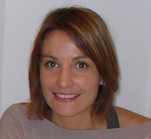
Sanja Frka Milosavljević, picture taken from the website
Sanja Frka Milosavljević has PhD in Natural Sciences (Geosciences – Oceanology) from Faculty of Science, University of Zagreb (Croatia). She did research visits at Norwegian College of Fishery Science, University of Tromsø (Norway), Department of Self- Organizing Molecular Systems, University of Leeds (Great Britain), Marine Chemistry Group, Alfred Wegener Institute for Polar and Marine Research, Bremerhaven (Germany), Air chemistry group at University of Pannonia, Veszprem (Hungary), Atmospheric processes and modelling group, Centre for Environmental and Marine Studies, Aveiro (Portugal). Her research interests are: Organic matter characterization of aerosols from rural, urban and marine environments; Electrochemical studies of ambient aerosol surfactants; Adsorption properties of organic matter and interactions with metal ions at phase boundaries; Rheological, morphological and optical properties of natural and model surfactant films; Physicochemical characterization of the air-water interface including the sea surface microlayer; Organic matter characterization of different natural marine systems; Lipid biogeochemistry.
This year she finished her NEWFELPRO project titled „Chemical nature of size segregated water soluble organic aerosols and their nitro-aromatic constituents (AERONAR)“. She has implemented the project at the National Institute of Chemistry (Slovenia) and Ruđer Bošković Institute, Zagreb (Croatia).
Her project contributes to the fundamental understanding of the chemical nature, sources and the mechanisms underlying WSOM transformation in the atmosphere. Water soluble organic matter (WSOM) as a significant fraction of atmospheric organic aerosols affects issues ranging from visibility impairment to aerosol effects on the Earth’s radiation balance. Our understanding of the chemical composition of WSOM and its humic-like (HULIS) fraction at the individual component level is still limited. Chemical characterization of just recently detected and potentially toxic nitro-aromatic compounds (NAC) in aerosols is an emergent issue to better understand their impact to the atmospheric chemistry and air quality. The AERONAR represents a first attempt to study the aerosol size segregated WSOM over the seasons with an emphasis on NAC through investigating their extraction efficiency, speciation and quantification, surfactant nature and interactions with environmentally relevant micro constituents.
Results of her project are published in „Quantum chemical calculations revised identification of abundant methylnitrocatechols in atmospheric particulate matter“ (authors: Sanja Frka Milosavljević, Martin Šala, Ana Kroflić, Matej Huš, Alen Čusak,Irena Grgić) in Environmental Science and Technology journal (Q1;IF=6,198). Also, two manuscripts relate to her NEFELPRO project are in the process of publication:
- Sesional variability of carbon in humic-like matter of ambient size-segregated water soluble organic aerosols from urban background environment (S.Frka, I. Grgić,J. Turšić, M. I. Gini, K. Eleftheriadis)- accepted for publication in Athmospheric Environment
- Size – resolved surface active substances of atmospheric aerosol: reconsideration of the impact on cloud droplet formation (A. Kroflić, S. Frka, M. Simmel, H. Wex, I. Grgić) – submitted to Environmental Science and Technology
Also, the AERONAR results have been presented within:
- European Aerosol Conference 2015, 6.-11.9.2015, Milano, Italy
- Ocean Science Meeting, February 2016., New Orleans, USA
- IGAC Science Conference, USA, 26-30.9.2016
- European Aerosol Conference 2016, 6.-9.9.2016, Tours, France
- International Conference on Aerosol Cycle-Sources, Aging, Sinks, Impacts, Mrch 2017, Lille, France
- European Aerosol Conference 2017, 28.8.-.1.9.2017., Zurich, Switzerland
- Slovenski kemijski dnevni 2017, 20.-22.9.2017., Portorož, Slovenia
- Air Protection 2017, October 2017, Primošten, Croatia
After the completion of her NEWFELPRO project, she is going to continue to do research on the topic of atmospheric chemistry. She would like to implement gained knowledge to her home institute by combining it with the marine biogeochemistry which is her complementary expertise. Thus, she is planning to apply for different kind of projects as further financial support is necessary prerequisite for working on those specific environmental topics of interests.
